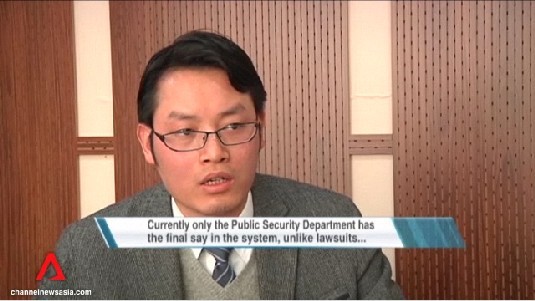杨状律师,法学学士,经济法学硕士,目前执业于上海,专注于公司商务、民事维权、刑事辩护及知识产权案件。
|
|
|
 |
021-63588005 |
 |
13774354747 |
 |
718140016 |
 |
yanglawyer123@126.com |
| 地址: 上海市普陀区新会路468号中环现代大厦13楼(近常德路、胶州路) |
|
|
|
|
| 杨状律师接受新加坡亚洲新闻台记者采访! |
| 来源: 点击:8106 时间:2013-03-14 18:10:16 |
|
|
日前,杨状律师就劳动教养问题接受新加坡亚洲新闻台记者采访!

Growing calls for abolishment of China's labour camps
By Valarie Tan | Posted: 01 March 2013 2216 hrs
SHANGHAI: A hot issue likely to be discussed at China's upcoming National People's Congress in Beijing is one that is not often talked about - re-education labour camps.
The system allows for detention of up to four years without trial -- and there are growing calls for it to be abolished.
26 year-old Ren Jianyu was arrested and held in police custody for 36 days in Chongqing, after allegedly posting some anti-government comments online in 2011.
Under China's forced re-education system, or "laojiao" in Mandarin, Ren was then sent to a labour camp for 15 months, without trial.
Ren said: "They said what I put online constitutes incitement to subvert the government. At that time, no one dared to appeal on my behalf as my case was sensitive. No lawyer wanted to take it up."
Ren's case is just one of many which have caught the public's attention in recent years.
Critics and lawyers have called for the system to be abolished, as it is unconstitutional and violates human rights.
The Gulag-style regime started in the 1950s, as a way for the government to censor political opponents.
Experts say there are about 60,000 people detained in these camps currently.
Detainees include prostitutes and drug offenders, and they have no legal recourse.
Lawyer Yang Zhuang said: "Currently only the Public Security Department has the final say in the system, unlike lawsuits which go through the courts. The Public Security Department uses its internal legislative affairs office to determine a person's freedom. There are no checks on the system."
There have been moves to do away with the system.
In January, Guangdong province applied to the National People's Congress to be the first province in China to close down such labour camps.
While talk of abolishing the labour re-education system at the official level started in 2005, change has been slow due to differing opinions from the police and legislators on how to deal with existing detainees.
Professor Sun Bo from Shanghai Institute of Politics and Law said: "After the system is abolished, detainees will be separated. They'll be divided between the criminal system and the public security system. A portion of which will come under a new law for re-education due to violations. So who has the legal right over these detainees, whether it's the courts or the police, that's where the interests collide."
Experts say publicity over cases where authorities allegedly abused the system to detain some people have increased the public's attention and criticism on the system, putting pressure on China's new leaders to reform the controversial procedure.
Experts say at the upcoming National People's Congress, officials are likely to table more suggestions and set up a plan of action as a first step to closing the labour camps.
- CNA/xq |
|
|


